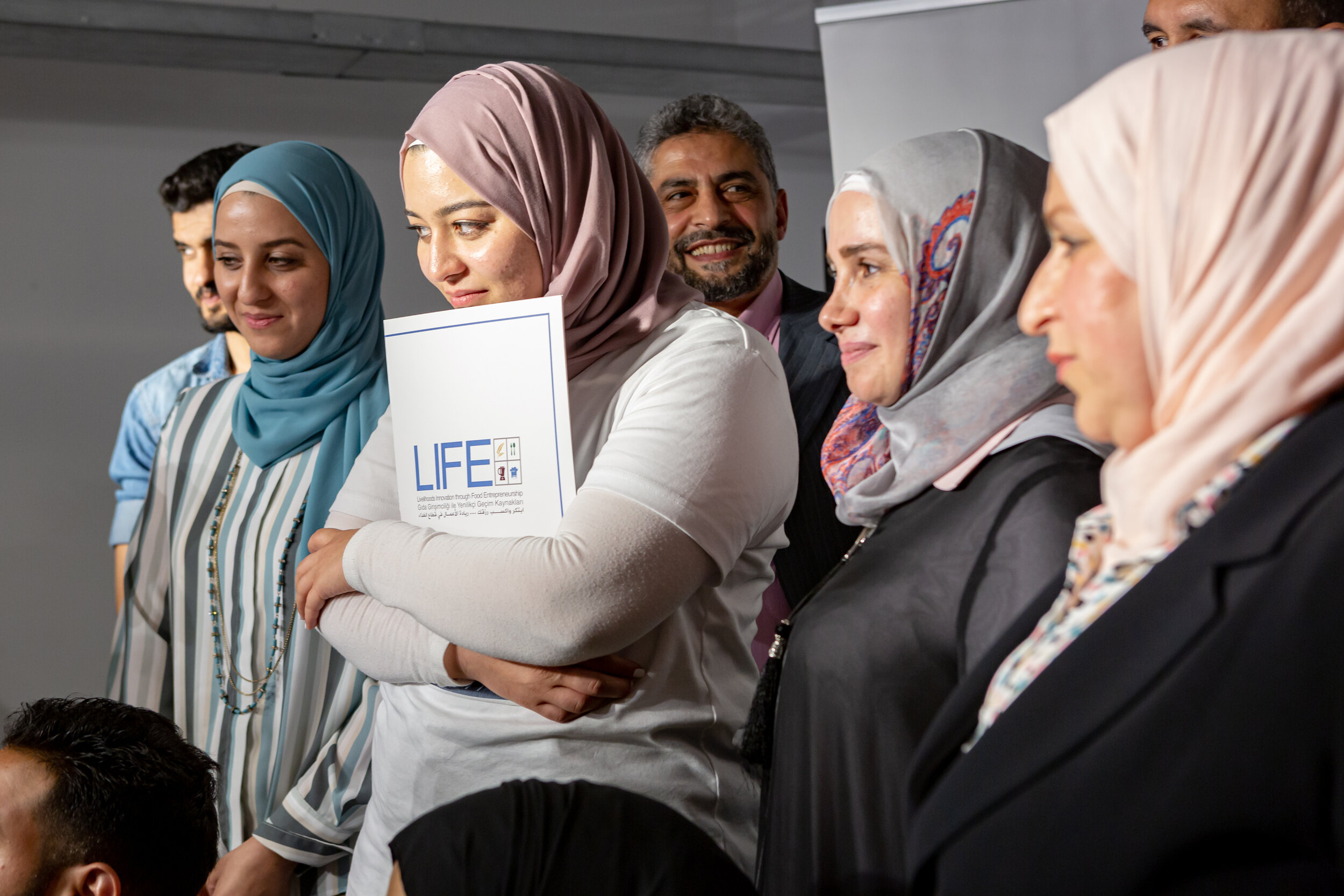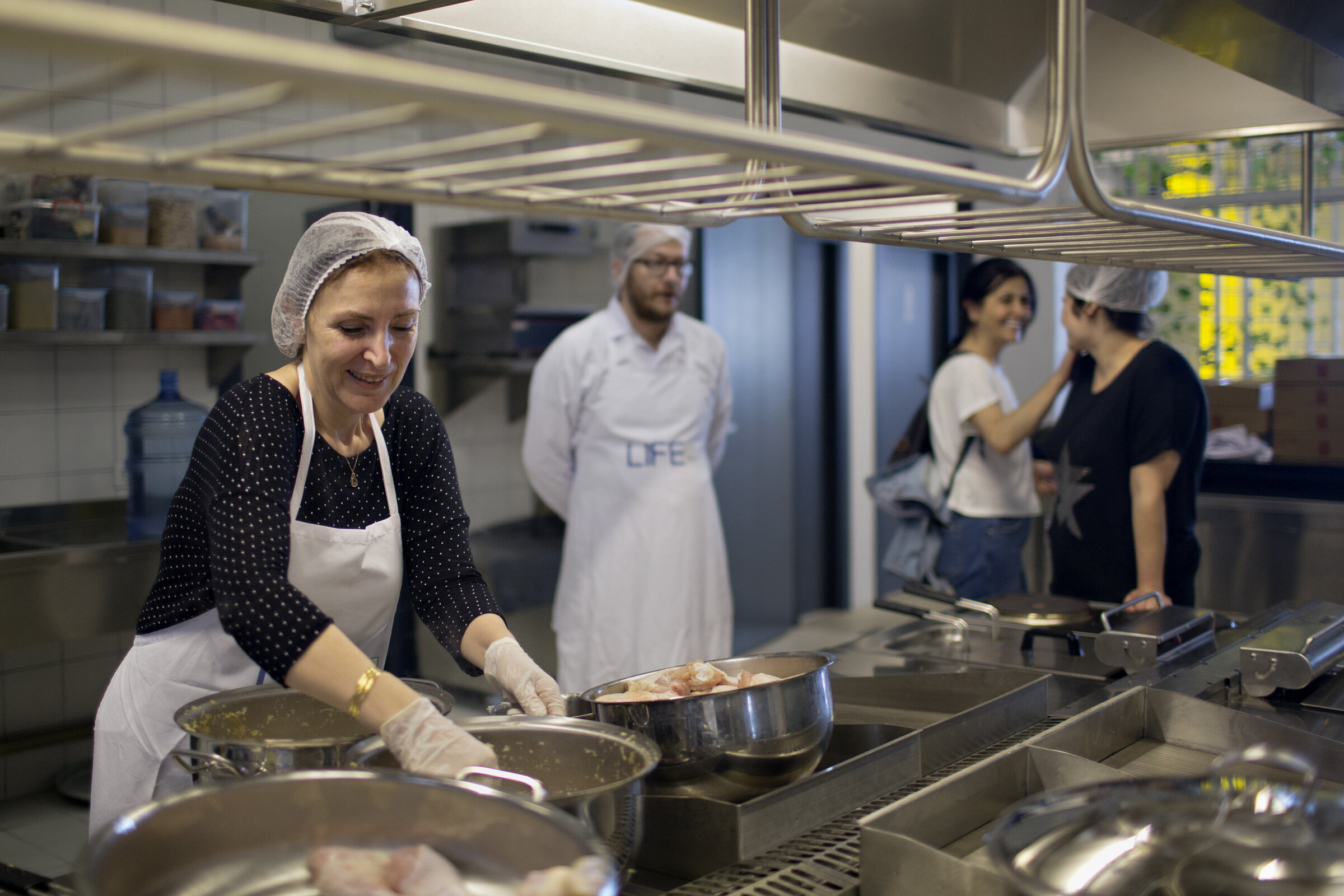Entrepreneur Incubation
The Entrepreneur Incubation program is the cornerstone of the LIFE Project’s effort to build sustainable livelihoods and foster social cohesion through food. Hosted within our Food Enterprise Centers in Istanbul and Mersin, the Entrepreneur Incubation program supports food entrepreneurs from refugee and host communities at every stage of their business journey.
The program is designed to expand entrepreneurial skills, deepen knowledge of local regulations, and build cross-cultural understanding to position entrepreneurs for success in the food industry. Throughout the four-month incubation period, training and support services are offered in both Turkish and Arabic, opening opportunities for entrepreneurs from a range of cultural backgrounds and nationalities.
The entrepreneurship coursework features a tailor-made curriculum for entrepreneurs developing businesses in the food industry and in the country of implementation. Members of each cohort advance through the training program together, sharing knowledge and experiences across cultures and skill sets to promote understanding and social cohesion.
Entrepreneurship Course
The LIFE curriculum is carefully designed, curated and localized to ensure entrepreneurs are receiving the best guidance suited for their skill level and business type. The curriculum includes 25 modules of specialized content and covers 60 hours of instruction on the principles of entrepreneurship, finances, marketing, business negotiations, legal and compliance requirements, among other subjects. Entrepreneurs are also trained on topics such as food safety and financing for food businesses. Each cohort commits to 12 weeks of instruction led by qualified trainers from the business community and academia.
Satisfactory completion of the training program is a condition of each member’s graduation from the incubator and participation in the Business Pitch Competition.
Business Pitch Competition
Throughout incubation, members are expected to develop, practice and hone their business pitch in preparation for the business pitch competition, which is the culmination of each incubator cohort. Through a two step process, members compete to present their business ideas to a panel of expert judges for the chance to win a small amount of seed funding or other prize aimed at helping members make further progress in their enterprise. Business Pitch Competition winners have used the seed funding to purchase necessary equipment, open formal locations for previously home-based ventures, and improve production methods.
Kitchen Use
Through membership in the Entrepreneur Incubation program, entrepreneurs have priority access to the facilities within the Food Enterprise Centers, including the commercial grade kitchen certified for small-quantity production and uniquely designed to allow multiple businesses to test their recipes and products at the same time.
Support Services
Entrepreneur incubation through the LIFE Project is about building successful food businesses. That extends well beyond the training to include a range of business support services.
In addition to a business development roadmap and other reference tools, members can utilize the services of on-site entrepreneurship experts within each FEC, including a licensed executive chef, food engineer, accountants, lawyers and other food business owners. These experts offer one-on-one services to entrepreneurs seeking guidance on specific questions related to their food business.
Formalization, Registration and Legal Support
The LIFE Project is committed to helping members achieve compliance with the laws and regulations applicable to their businesses. Navigating the process for business formalization, registration and other legal and accounting requirements for starting or running a food business is particularly complex.
To encourage sustainability and full inclusion in the local economy, each FEC provides support to participating entrepreneurs with business formalization, including registration procedures and compliance with local legal, and overlapping accounting, requirements.
Access to Funding and Start-Up Support
Each FEC assists its members in identifying funding for their enterprises from outside sources, including capital investments, loans, and grants. The FEC staff engages potential in-country and international financiers and coaches entrepreneurs in developing proposals and pitches.
The FEC staff also guide members as they find and secure locations, discounted or second-hand equipment, and other business solutions necessary to launch their ventures. Market access services are also provided to support enterprise growth.
Problem-Solving
In addition to providing structured services, FEC staff are highly responsive to individual requests for services and support, connecting members with individuals and resources to solve their specific business needs. The FEC staff helps members solve their biggest business challenges by connecting entrepreneurs with different elements of the ecosystem, accessing factors of production and distribution channels on favorable terms, forging relationships and facilitating business deals.
Workshops and Networking Opportunities
In addition to the core LIFE curriculum, members have access to expert-led specialized and technical workshops. These one-day trainings provide participants with additional culinary, business, and marketing skills. The workshop offerings are developed based on members’ input and specific areas of interest, such as access to finance, entering the Turkish food market, and food regulation.
Networking and experience-sharing events are organized on a regular basis to expose members to a variety of experiences of successful food entrepreneurs and build their own network within the Turkish food industry.
Members are invited to participate in occasional Demo Days hosted at the FECs. These events offer members the opportunity to share their products with potential customers and network with business leaders in their communities. Demo Days also give members a way to receive real-time feedback on their product and branding, which they can use to further improve their business competitiveness.
Community Building and Engagement
Gastrodiplomacy is a signature initiative within the LIFE Project, which builds social cohesion by leveraging food as a medium for cross-cultural engagement and understanding. FECs are forums for gastrodiplomacy, which is infused throughout all major program components.
The LIFE Project fosters social cohesion through day-to-day interaction in the FEC, structured events and activities, peer learning, business-to-business opportunities, and engagement of outside stakeholders. Events during the incubation periods feature member dishes and highlight the cross-cultural exchange being fostered by the program. This involves cooking demonstrations; storytelling about the origins of dishes, their cultural connections, and members’ journeys as food entrepreneurs; and communal meals.
These gastrodiplomacy efforts extend beyond refugee and host communities in Turkey to home kitchens around the world with the LIFE Project cookbook The Cuisine of LIFE: Recipes and Stories of the New Food Entrepreneurs of Turkey. The cookbook tells the stories of 24 alumni of the Entrepreneurship Incubation program from 2018 in Istanbul, with 58 recipes representing the culinary heritage of seven different nationalities living in the same city.
The FECs provide diverse opportunities for members and the broader business community to promote livelihoods and reduce social tensions through gastrodiplomacy. Social cohesion activities are designed and integrated in the training curriculum for the incubator program to promote social bonds while facilitating learning.


.jpeg)

























.jpg)






.jpg)